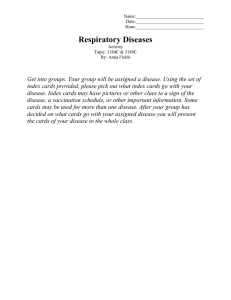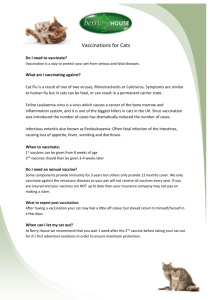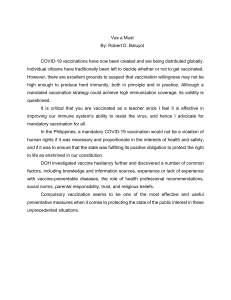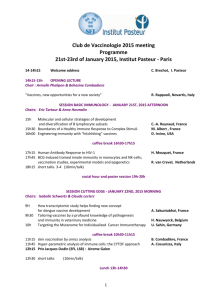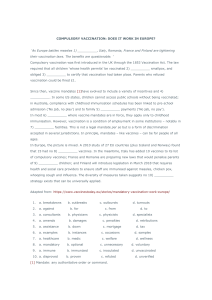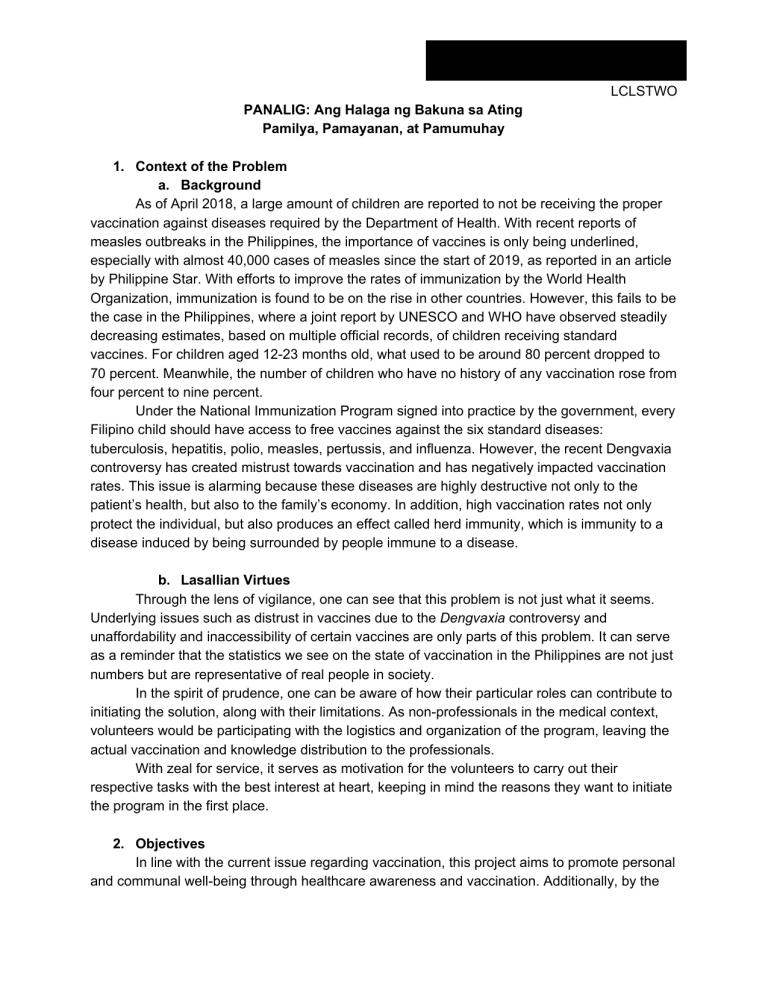
ABADILLA, ARIVE, GOMEZ, INCOMIO, MAGPANTAY, WALTHERN LCLSTWO PANALIG: Ang Halaga ng Bakuna sa Ating Pamilya, Pamayanan, at Pamumuhay 1. Context of the Problem a. Background As of April 2018, a large amount of children are reported to not be receiving the proper vaccination against diseases required by the Department of Health. With recent reports of measles outbreaks in the Philippines, the importance of vaccines is only being underlined, especially with almost 40,000 cases of measles since the start of 2019, as reported in an article by Philippine Star. With efforts to improve the rates of immunization by the World Health Organization, immunization is found to be on the rise in other countries. However, this fails to be the case in the Philippines, where a joint report by UNESCO and WHO have observed steadily decreasing estimates, based on multiple official records, of children receiving standard vaccines. For children aged 12-23 months old, what used to be around 80 percent dropped to 70 percent. Meanwhile, the number of children who have no history of any vaccination rose from four percent to nine percent. Under the National Immunization Program signed into practice by the government, every Filipino child should have access to free vaccines against the six standard diseases: tuberculosis, hepatitis, polio, measles, pertussis, and influenza. However, the recent Dengvaxia controversy has created mistrust towards vaccination and has negatively impacted vaccination rates. This issue is alarming because these diseases are highly destructive not only to the patient’s health, but also to the family’s economy. In addition, high vaccination rates not only protect the individual, but also produces an effect called herd immunity, which is immunity to a disease induced by being surrounded by people immune to a disease. b. Lasallian Virtues Through the lens of vigilance, one can see that this problem is not just what it seems. Underlying issues such as distrust in vaccines due to the Dengvaxia controversy and unaffordability and inaccessibility of certain vaccines are only parts of this problem. It can serve as a reminder that the statistics we see on the state of vaccination in the Philippines are not just numbers but are representative of real people in society. In the spirit of prudence, one can be aware of how their particular roles can contribute to initiating the solution, along with their limitations. As non-professionals in the medical context, volunteers would be participating with the logistics and organization of the program, leaving the actual vaccination and knowledge distribution to the professionals. With zeal for service, it serves as motivation for the volunteers to carry out their respective tasks with the best interest at heart, keeping in mind the reasons they want to initiate the program in the first place. 2. Objectives In line with the current issue regarding vaccination, this project aims to promote personal and communal well-being through healthcare awareness and vaccination. Additionally, by the end of this program, the community would be able to make more aware decisions after being presented factual information. These objectives are intended to be achieved by the multi-step plan below: Phase I: Immersion and Field Study In this phase, with the requested support and approval of the barangay, members of the project will be adopted by host families within the community, preferably lasting for at least 2-3 weeks until up to a month. During this time, the team will dedicate themselves to experience firsthand the reality of the families living in this community. Within the timespan allotted, members should be able to establish a moderately strong level of trust and pakikisama with their host families and, if possible, to other nearby members of the community. At the same time, the team will be meeting with each other twice a week regarding updates and discussing what type of vaccine would best suit the community, in coordination with the designated healthcare worker stationed in the community. At the end of the immersion, all members will reflect on their experiences, finalize details to tailor the project specifically to the community, and identify community members that can share their experience regarding vaccines as they will be able to help convince other members of the community to participate in the program. Phase II: Partnership and Collaboration After immersion, the team will send requests for partnership and collaboration to various organizations and government agencies that align with our cause. With this, the team would be able to acquire some experts and resource speakers to help conduct our seminars and provide materials for the mass vaccination such as medical supplies (alcohol, gauze, needles, etc.) and vaccines. During this time, the team will be preparing all necessary documents and requests to pursue the seminar and vaccination program. Potential Partner Organizations For experts and medical personnel needed for the vaccination program: 1. Department of Health - Disease Prevention and Control Bureau a. Address: P.J. Garcia Ave, Santa Cruz, Manila, Metro Manila b. Email (DOH): callcenter@doh.gov.ph 2. Philippine Foundation for Vaccination a. Address: Section of Infectious & Tropical Diseases, Philippine General Hospital, Taft Avenue, Manila, 1000 Metro Manila b. Email: pfvinc4.27@gmail.com c. Number: (02) 567 2397 3. Philippine Red Cross a. Address: 37 EDSA corner Boni Avenue, Mandaluyong City 1550 b. Email: nbs@redcross.org.ph c. Number: (02) 790-2300 local 931/932/935 For medical supplies and vaccines: 1. World Health Organization a. Address: Ground Floor, Building 3, Department of Health, San Lazaro Compound, Rizal Avenue, Sta. Cruz, Manila b. Email: wpphlwr@who.int c. Number: (632) 528-9762 2. United Nations Children’s Fund a. Address: 14th floor, North Tower, Rockwell Business Center Sheridan Sheridan Street, corner United St, Mandaluyong, 1550 Metro Manila b. Email: psfrmanila@unicef.org c. Number: +63 2 249 5400 3. Pharmaceutical and Healthcare Association of the Philippines a. Address: Unit 502, One Corporate Plaza, 845 Antonio Arnaiz Ave, Legazpi Village, Makati, 1229 Metro Manila b. Email: phap7346@phap.org.ph c. Number: +632 865 5600 Phase III: Seminars on Vaccination and Vaccination Program The seminar on vaccination and vaccination program is the two-step project that we wish to implement in order to address the issue of vaccine scare and mistrust. The first day of the project will see five vaccine talks that would cover basic information regarding vaccines as well as address what happened during the Dengvaxia controversy as a means to hopefully disperse the fear surrounding vaccines especially after the incident. Suggested topics for the talks are as follows: 1. How vaccines work 2. What vaccines should be taken and when it should be taken a. Important vaccines relevant to the Philippines b. Immunization calendar 3. What happens when vaccines are not taken a. Individual scale b. Community scale 4. Laws and rights of citizens regarding vaccines 5. Issue regarding Denvax a. What happened in the Dengvaxia controversy b. Why vaccines are still safe On the second day, a vaccination program will be held. However, limitations shall be set in order to avoid issues arising due to overcomplications and establish an efficient system. Parameters 1. Only the most needed vaccine/s will be given, as assessed during immersion. 2. Only children of ages 12 and below will be prioritized for immunization as they are more susceptible to disease. 3. Only those with existing vaccination records will be entertained in order to avoid administration of vaccines that have already been given to a child An incentive such as school supplies and half a kilogram of ricewill be given to each child that receives a vaccination. This incentive is given in order to encourage parents to allow their children to be immunized. Scheduling of Activities Day one–Seminar 7:30AM-9:30AM What are vaccines What vaccines to take and when to take them 9:30AM-10:00 Breaktime with Snacks 10:00AM-12:00PM Consequences of non vaccination Laws and rights regarding vaccination 12:00PM-1:00PM Breaktime with Lunch 1:00PM-2:00PM What happened with Denvax? 2:00PM-3:00PM Question and Answer portion with the experts Day two–Vaccination 9:00AM-12:00PM Vaccination (AM Schedule) 12:00-1:00PM Lunch Break for staff 1:00-4:00PM Vaccination (PM Schedule) 4:00pm-5:00pm Distribution of rice incentive 3. Specific Details a. Context-sensitive In order to fully understand the situation and needs of the people in the target community, it is part of the program to visit the community itself and interact with the residents, first to survey their stand on vaccinations, then to hear out their concerns and needs. Additionally, in order to carry out the program efficiently, the organizers will be coordinating with the local government officers and assigned health officers of the community to assist in communicating with the residents. b. Life-affirming The aim of this initiative is not simply just to inform the residents of the value of immunization, but to help them understand the importance of preserving their health. The objective of the seminar is to foster the residents’ willingness to take concrete actions to properly seek out the healthcare they need based on facts and proper advice of medical professionals and inform them of their rights to certain healthcare services that are offered by the government through DOH. c. Mutually-empowering The program aims to encourage the residents to take care of themselves with the realization of their own capabilities to seek the proper medical attention out on their own. It would allow them to have a healthier state of living, helping them live life to the fullest, and empowering them to maximize that opportunity d. Capacitating Emphasizing the importance of health creates an attitude of proper well-being that will enable people to do what they want. Being protected from disease is capacitating in the sense that the chance of being hampered or obstructed from doing everyday tasks by disease is lowered. Not only does being healthy allows one to achieve maximum capacity, it also saves money that can be used for more primary and important needs such as food or education. Comments Comments to Improve the Presentation/Project Responses -Commend for targeting vaccination. Suri-Nilay - What needs to be done; other factors: capabilities; address specific issues; desire to help the community -marginalized lack access to basic information (sensationalized news) - Discuss more about the Suri-Nilay Part (Analysis and reflection) -Commend for partnership with organizations - Inserted statement in the program requiring all project personnel to undergo vaccination if they have not done so - Make sure to participate during the actual vaccination -Statistics in terms of belief and disbelief in the Philippines about vaccination - look into the trend of belief and disbelief on vaccines in the PH -85 – 90% to 30 – 40% trust - accessibility to information is a factor Masid – danas: what made us choose this information or initiative to perform vaccination. -What made us choose this intervention on vaccines? - Filipinos tend to focus on sensationalized media that influences the perspectives of illiterate and marginalized people. - Dengvaxia led to distrust and controversy - decide to push with the vaccination program due to accessibility: people may be lazy, or lack the initiative. - more practical side: due to connections, they are easy to be prevented; easy access to these vaccines Summary: regain the trust to vaccination -implementation is based on conscious decision - remember where you’re coming from; your reason motivates you to execute the program Actions Taken - Stated news articles from Philippine Star and reports from UNESCO and WHO Trust: People don’t trust vaccines and doctors: How to convince the people to attend the seminar? How to encourage so that information will be disseminated? - The topic might be deterrent to the people; part of the suri-nilay and masid-danas; we may need to immerse in the community so we will understand how to convince the people. -People are likely to do something if they are to perform something out of their autonomy. - Effectivity of sending the message; our project is a good interdisciplinary project; speaker should be somebody from their community that they trust and someone who is popular and influential to them -talk with people from communication and psychology (consult with people from other fields) - Talk to the barangay heads; see the general idea of the community towards immunization - Use the local people themselves to convince their fellows to attend the seminar. - Regarding how to convince people to attend the seminar, we will be requesting the presence and support of the Barangay Chairman - We would also see if there would be anyone within the community willing to testify and support the program - We will also do our best to build a sense of trust and pakikisama during our time immersed in the community - Talk with barangay helpers; talk with 4Ps leaders for incentive (local heroes) -Timeline: how long we will be immersed in the community - Role natin (wingman o manliligaw?) - Incentive of rice: cons – people will go the event for the rice but not the event. Small infographic or calendar as additional incentive (motivational visuals) -Identify objects with novelty that are long-lasting so that it will be more long-lasting and sustainable. - After revision of the proposal; make partnership with red cross in the school Pass bruh
